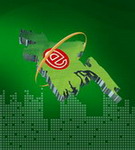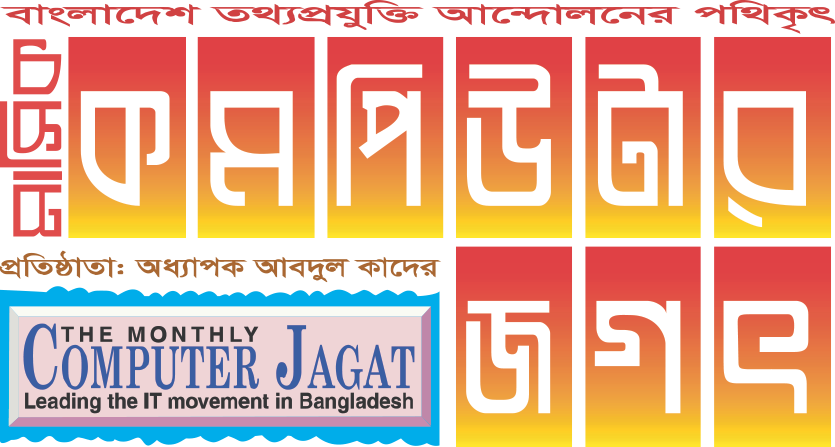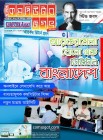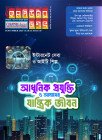হোম > Bangladesh Is Striving for Rapid Use of ICT at all Strata
লেখক পরিচিতি
লেখকের নাম:
তারেক মাসুদুর বরকতুল্লাহ্
মোট লেখা:১২
লেখা সম্পর্কিত
পাবলিশ:
২০১১ - অক্টোবর
তথ্যসূত্র:
কমপিউটার জগৎ
লেখার ধরণ:
আইসিটি
তথ্যসূত্র:
ইংরেজি সেকশন
ভাষা:
বাংলা
স্বত্ত্ব:
কমপিউটার জগৎ
Bangladesh Is Striving for Rapid Use of ICT at all Strata
As a developing country, Bangladesh is striving to create an environment for rapid dissemination of ICT at all strata of the society. In this respect, Government of Bangladesh has shown keen interest in this sector. ICT is regarded as a thrust sector and the present Government has pledged to build up a digital Bangladesh within 2021. The activities to realize Vision 2021: Digital Bangladesh has led to the improvement of country ranking in the World e-Readiness Index and Gartner Report published in December 2010 has included Bangladesh within the list of 30 destinations for outsourcing.

While the developed countries of the world have exploited the potential of science and technology in national development, developing countries have fallen behind. Resource constraint, inadequate ICT capacity, and lack of appreciation of the power of ICT may be cited as the reasons. The revolutionary development in the field of ICT has opened up new opportunities for developing countries to move forward in the path of progress by rationally exploiting its potential. In view of that, Bangladesh has been aspiring to achieve economic development through the application of Science and Information and Communication Technology (ICT). The Government of Bangladesh has taken steps in this connection. The Government focuses on the reduction of poverty by applying ICT, increase in efficiency, productivity, transparency, access to information by the citizens. Citizens at large will be empowered with necessary information for efficiency performing their tasks.
National Policy on ICT
The government is committed to make Bangladesh Digital by 2021. The present Government has considered ICT as driving tools for Socio-Economic Development. Considering the expectation & commitment, the Government has adopted the National ICT Policy on July, 2009, which can be considered as a Road Map of Vision 2021: Digital Bangladesh.
The policy aims at implementing 306 action items of short (18 months or less), mid (5 years or less) and long term (10 years or less) action items aligned with the general national goals while the strategic themes are areas within the broad objectives that can readily benefit from the use of ICTs. These goals compliments the UN Resolution 64/187 declaration recognizing pivotal role of ICT in promoting development, including with respect to enhancing access to information and communication technologies, inter alia, through partnership with all relevant stakeholders.
The Government of Bangladesh through Ministry of Science and ICT (MoSICT) has initiated number of projects and programs to achieve the objectives of National ICT Policy 2009 and UN Millennium Development Goal. Notable ongoing projects and programs of the government under Ministry of Science and Information & Communication Technology are given in the table below:
PiCture
Apart from these projects all other government ministries / departments / organizations have taken projects and programs utilizing ICT for economic emancipation and development of underprivileged mass. Some of the noteworthy online contents deployment are:
01. Community e-Centers, Online Hajj management,
02. Online Public Exam. Result publication,
03. Pilot projects of land records digitization,
04. e-Tendering,
05. Online Agricultural Information etc.
Liberalization Foreign Direct Investment (FDI) Policy
The Government has also liberalized the trade regime, investment environment as well as other macro-economic policies and has provided attractive packages of incentive towards encouraging FDI in the country. For foreign investors in the ICT industry, Bangladesh offers a range of services and incentives as follows:
PiCture
Growth of ICT Infrastructure
Computer and Internet
* The growth of PC use and Internet user's growth is increasing gradually but still it's not quite remarkable due to lack of content and affordability.
Personal Computer user per 1000 population : 26 (2.6%)
Internet user per 1000 population : 3.4 (0.34%)
* PC User (estimated) : 3.0 Sets/1000 Peoples
* ISP Subscriber (estimated) : 0.5 million
Telecommunication
Telecommunication is growing very fast in Bangladesh. The tele-density (fixed line and cellular) in Bangladesh is 40.71 percent (Source: BTRC).
A total of 12 landline operators have so far been awarded licenses. (landline subscribers: 1.08 million) (Source: BTRC).
At present 6 mobile phone companies are operating in Bangladesh. About 59.98 million subscribers have come under the coverage of mobile network as on June 2010 (Source: BTRC).
Domestic ICT Industry and Software Market
The market size of the ICT Industry in Bangladesh is estimated to be around US$ 200 million/year (excluding the telecom sector).
Out of this the software segment is estimated to be more than US$ 30 million/year.
Locally there are over 500 software companies with 50,000 knowledge workers are operating in the country, mainly catering to the customized software development and maintenance segment of the market.
An encouraging sign is that 57% of the software companies are involved in Government sector IT projects.
It is a positive sign since the Government sector is potentially the biggest client for the software industry, with the National IT Policy guideline of allocating upto 5% of ADP, and 2% of revenue budget for IT.
Currently more than 100 companies are exporting software and outsourcing to more than 30 countries.
At least 40 Offshore Development Centers (ODC) and Joint Ventures started working during the last 2-3 years, out of which 10 are with Danish IT firms.
Growth of Software Export
The growth of software export in 2008-09 is 24.82 million USD which shows a increasing trend in comparison to the export in 2007-08 after collapse of the global economy.
PiCture
Government Initiatives for Promotion
> Exemption of Tax/VAT on Computer Hardware and Software.
> Deregulation of Telecom Sector & Establishment of BTRC .
> Installation of Digital Data Network in all Districts and Upazilas .
> Creation of Equity Entrepreneur Fund for the Investors.
> Protection of Intellectual Property Right
> Distribution of computers to School/Colleges
> Establishment of ICT Business Promotion Council
> Standardization of Bangla for Use in Computing Equipment
for HRD-
> ICT Training for the Government Employees.
> Computer Training for Secondary School/College Teachers.
> Introduce Post-Graduate Diploma (PGD) Program in public Universities to produce quality ICT Professionals.
> ICT Internship program to provide on the Job training to new graduates. Govt. is providing 60% of their monthly allowance & 40% by the organization.
> Has setup standard computer training centers at Divisional & District headquarters.
> Establishment of Bangladesh-Korea Institute of Information and Communication Technology (BKIICT) in collaboration with KOICA.
> ICT Professional Skill Assessment and Enhancement Program (IPSAEP) through establishment of a government owned company ICT Capacity Development Company (ICDC) Ltd.
> Establishment of training Laboratories in the educational institutions at Upazilla level.
> Establishment of Community e-Centers in the rural area throughout the country by the Government,
for Infrastructure-
> Establishment of ICT Incubator for the Development of Software and ICT enable services.
> Hi-Tech Park- A would class Hi Tech Park will be established on 231 acres of land near Dhaka with all modern facilities.
> 128 Computer Labs in Schools and Colleges are going to be established in 64 district headquarter.
> Information Highway project under SASEC
> Empowering rural people through community e-Centers under SASEC
> Establishment of IT Village in Mohakhali is under consideration of Government
> Development of National Infra-Network for Bangladesh Government (BanglaGovNet)
for e-Governance-
> Formulation of e-Government strategy for Bangladesh
> Creation of a Pool of ICT Professionals
> Establishment of LAN & Internet facilities in 49 Ministries/Divisions
> Supply of Hardware/software to the Ministries/Divisions
> Assist Ministries/Divisions in creating websites and hosting information on the utility services provided by them
for Legislations-
> ICT (electronics transaction) Act-2006 has been enacted, which will legislate e-commerce, digital Signature, protect cybercrime etc.
> An amendment has been made on Bangladesh Telecommunication Act. 2001 in February 2006 for the legalization of the Lawful Interception in Communications.
> Necessary provisions have been incorporated in the Copy Right Act 2000 (Revised) to protect the IPR of software.
> Controller of Certifying Authorities (CCA) has been appointed.
> Appointments of Certifying Authority (CA) is ongoing.
> National ICT Policy 2009 adopted.
> National Broadband Policy 2008 passed.
> National ICT Act. 2009 (Amendment)
Potential of Bangladesh ICT Sector
> Huge Youth Workforce;
> Introduction of Equity Entrepreneur Fund (EEF);
> In recent years a thriving ICT industry has emerged in Bangladesh;
> It can be described with four words i.e. high quality, low cost;
> Many of Bangladeshi ICT companies have considerable experience with overseas clients and a successful track record in managing outsourced software projects for foreign companies.
> Low salary cost and low production cost in general are a major attraction for the ICT industry in Bangladesh. Monthly earning of a trained software engineer here ranges from US$ 200 to 250 that is a fraction of salaries in Europe or USA and also less than salaries of this type of workforce in other countries in the South & South-East Asian region.
> More than 50 Universities and 60 colleges offer ICT courses at Bachelors and Masters Levels, many of them cooperate with overseas universities and institutions in US, in Europe and in Australia and guarantee international standards.
> By one estimate, Bangladesh's institutions produce more then 4000 ICT graduates per year; the output is expected to rise to 10,000 in the coming years.
> ICT Business Promotion Council has been formed under Ministry of Commerce to have focused-activities on ICT on Private and Public sector partnership.
> The large and growing pool of skilled professionals has been a key driver of the rapid growth in Bangladesh IT & ITES.
This rapid growth in the industry employment has been facilitated by the combination of two fundamental factors -
i. A favorable demographic profile - with nearly 60 per cent of population are between the ages 15-59, and nearly half of its population below the age of 21. In contrast, countries including the US, Europe, Japan and China have a more aged population with dependency ratios likely to increase over the same period.
ii. A relatively large, expansive and established network of academic infrastructure - the most of its strengths are the unleashed English speaking youth force, skilled professionals working aboard, universities & other educational institutions turning out huge ICT graduates, substantial number of ICT graduates studying abroad and skilled work force available at most competitive wages.
Bangladesh has become an ideal ground for advanced economies to invest due to its business friendly policy for the foreign investors and providing various incentives including tax holidays and simplified regulations.
Bangladesh is one of the most populous nations in the world and recent economic indicators showing positive outlook. In addition, there seems to be acceleration in the amount of focus and investment from multinational IT vendors and IT promotion bodies that is generating a greater level of marketing and awareness that we expect to boost the demands.
Conclusion
Like most of the developing countries around the world the Government of Bangladesh has also attached significant importance on making Bangladesh Digital with the effective use of ICT as a useful tool for development in wide spectrum of socio-economic activity.
Government of Bangladesh is working on digitization of land records, judiciary and health care, disaster management etc with local language content.
IGF Member states/organizations can cooperate towards development of Human Resource Development and common accreditation practices of ICT Professionals.
Cybercrimes are trans-national affair. Recent attack on national web portal from overseas hackers indicates some of these trans- national criminal activities. IGF member states/institutions can setup a common resource pool to prevent such crime and share information on cybercrime related issues.
CJ WEB
লেখাটি পিডিএফ ফর্মেটে ডাউনলোড করুন
লেখাটির সহায়ক ভিডিও
পাঠকের মন্তব্য
২০১১ - অক্টোবর সংখ্যার হাইলাইটস
অনুরূপ লেখা





